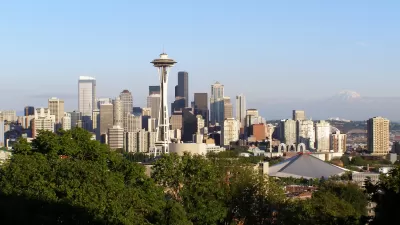Seattle's incentive zoning program is paying dividends and funding projects. Look for 110 affordable units to be built in the Capitol Hill neighborhood by 2019.
Seattle Mayor Ed Murray recently "announced $47 million in funding for affordable housing via the City’s optional incentive zoning program and the housing levy," reports Doug Trumm.
Seattle's incentive zoning (not to be confused with inclusionary zoning) "allows developers an extra floor above normal height limits in exchange for either the performance option of restricting some units below 80% [area media income] on site or the payment option of contributing to the City’s affordable housing fund," explains Trumm.
While the city of Seattle prepares its initial forays into mandatory inclusionary zoning with the upcoming University District rezoning, "Incentive Zoning receipts were $13 million larger than the Seattle Office of Housing anticipated." Paired with "$15 million earmarked for affordable multi-family housing from the 2009 Housing Levy," the city now has enough affordable housing funding to build 610 units. Among those 610 units are 110 affordable units to be built on a site in the Capitol Hill neighborhood, as detailed in the article.
FULL STORY: Incentive Zoning Nets $32 Million To Help Fund 610 Affordable Homes

Maui's Vacation Rental Debate Turns Ugly
Verbal attacks, misinformation campaigns and fistfights plague a high-stakes debate to convert thousands of vacation rentals into long-term housing.

Planetizen Federal Action Tracker
A weekly monitor of how Trump’s orders and actions are impacting planners and planning in America.

Chicago’s Ghost Rails
Just beneath the surface of the modern city lie the remnants of its expansive early 20th-century streetcar system.

Bend, Oregon Zoning Reforms Prioritize Small-Scale Housing
The city altered its zoning code to allow multi-family housing and eliminated parking mandates citywide.

Amtrak Cutting Jobs, Funding to High-Speed Rail
The agency plans to cut 10 percent of its workforce and has confirmed it will not fund new high-speed rail projects.

LA Denies Basic Services to Unhoused Residents
The city has repeatedly failed to respond to requests for trash pickup at encampment sites, and eliminated a program that provided mobile showers and toilets.
Urban Design for Planners 1: Software Tools
This six-course series explores essential urban design concepts using open source software and equips planners with the tools they need to participate fully in the urban design process.
Planning for Universal Design
Learn the tools for implementing Universal Design in planning regulations.
planning NEXT
Appalachian Highlands Housing Partners
Mpact (founded as Rail~Volution)
City of Camden Redevelopment Agency
City of Astoria
City of Portland
City of Laramie




























